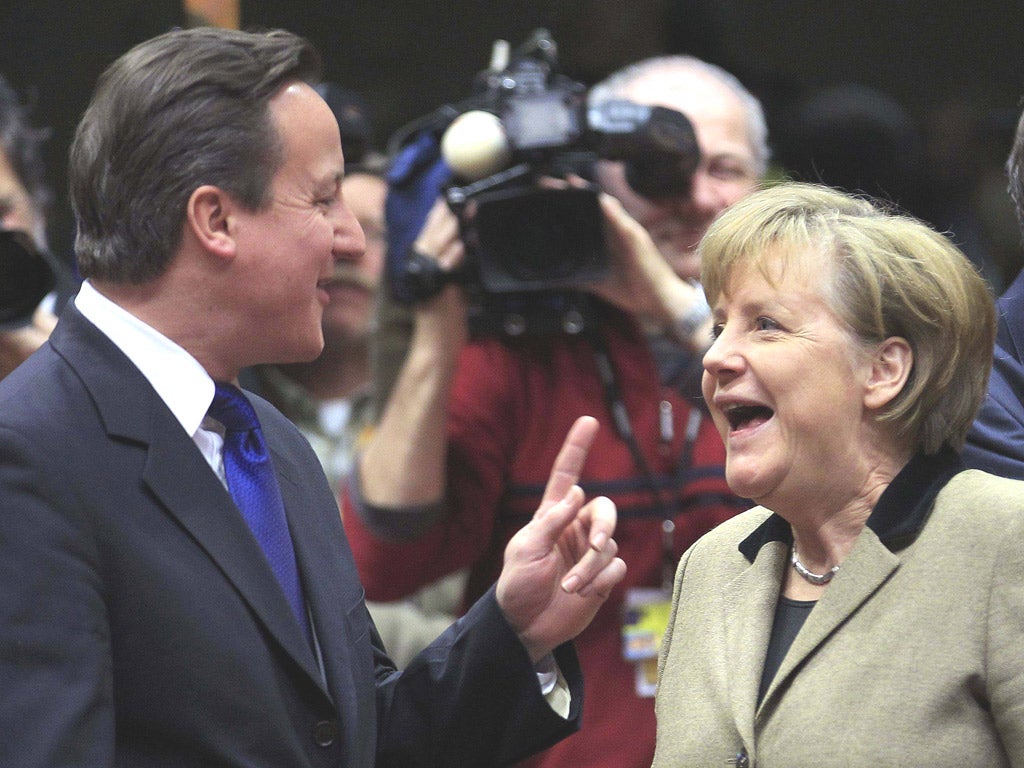Cameron faces Tory Eurosceptic fury after relenting on eurozone budget rules
Backbenchers attack PM for watering down objections to EU-wide 'fiscal compact'

Your support helps us to tell the story
From reproductive rights to climate change to Big Tech, The Independent is on the ground when the story is developing. Whether it's investigating the financials of Elon Musk's pro-Trump PAC or producing our latest documentary, 'The A Word', which shines a light on the American women fighting for reproductive rights, we know how important it is to parse out the facts from the messaging.
At such a critical moment in US history, we need reporters on the ground. Your donation allows us to keep sending journalists to speak to both sides of the story.
The Independent is trusted by Americans across the entire political spectrum. And unlike many other quality news outlets, we choose not to lock Americans out of our reporting and analysis with paywalls. We believe quality journalism should be available to everyone, paid for by those who can afford it.
Your support makes all the difference.David Cameron provoked a furious backlash by Conservative Eurosceptics last night after he beat a retreat over his opposition to the agreement to enforce budgetary discipline in the eurozone.
Tory MPs who hailed him as a hero last month when he vetoed an EU-wide treaty to save the euro turned their fire on the Prime Minister after he watered down his objections to the "fiscal compact". His critics claimed the gains he made last month had now been lost.
At the time, Mr Cameron insisted other EU nations could not use bodies such as the European Court of Justice (ECJ) to enforce fines on euro members who breach deficit limits. He feared this could harm British industry by eroding the single market. But at another EU summit in Brussels last night, Mr Cameron nodded through the agreement—although Britain will remain outside it. The Czech Republic also refused to sign up, leaving the UK in a minority of two in the 27-nation bloc.
Another threat to the 25-strong agreement emerged when Nicolas Sarkozy, the French President, said his country was unlikely to ratify it before the presidential elections this spring.
Denying a climbdown, Mr Cameron said after the meeting: "We don't want to hold up the eurozone doing whatever is necessary to solve the crisis as long as it doesn't damage our national interests." He insisted the agreement among the 25 would not undermine the single market.
The Prime Minister said: "There are a number of legal concerns about this treaty. That's why I reserved the UK position on it. We will only take action if our national interests are threatened. We will be watching like a hawk."
However, there is little prospect that the UK will take legal action – not least because the case would be heard by the ECJ itself, which normally rules in favour of European integration.
Mr Cameron faces criticism over his retreat when he makes a Commons statement about the summit today. Philip Davies, a Eurosceptic, warned the new stance would make the Prime Minister look more like John Major than Margaret Thatcher. "We saw in the opinion polls how popular he was in December. He would be equally unpopular if the British public thought he was going to backslide from that position," he said.
Douglas Carswell, another Tory Europhobe, said: "I don't see how the veto is really a veto if we allow the fiscal union to form, and then find ourselves subject to the EU institutions being used to govern that. In effect we will find that for all the talk of a veto, we find ourselves hauled into this process."
Mr Cameron tried to use yesterday's gathering to build bridges. But there was little sign of a rapprochement with France as he hit back at Mr Sarkozy, who declared in a TV interview on Sunday: "The UK has no industry any more." Mr Cameron replied: "We have a larger industrial sector than France."
There were also tensions between the UK and Germany. A British official cast doubt on the German-driven plan to prevent a repeat of the eurozone debt crisis. "To write into law a Germanic view of how one should run an economy and that essentially makes Keynesianism illegal is not something we would do," the official said.
Join our commenting forum
Join thought-provoking conversations, follow other Independent readers and see their replies
Comments